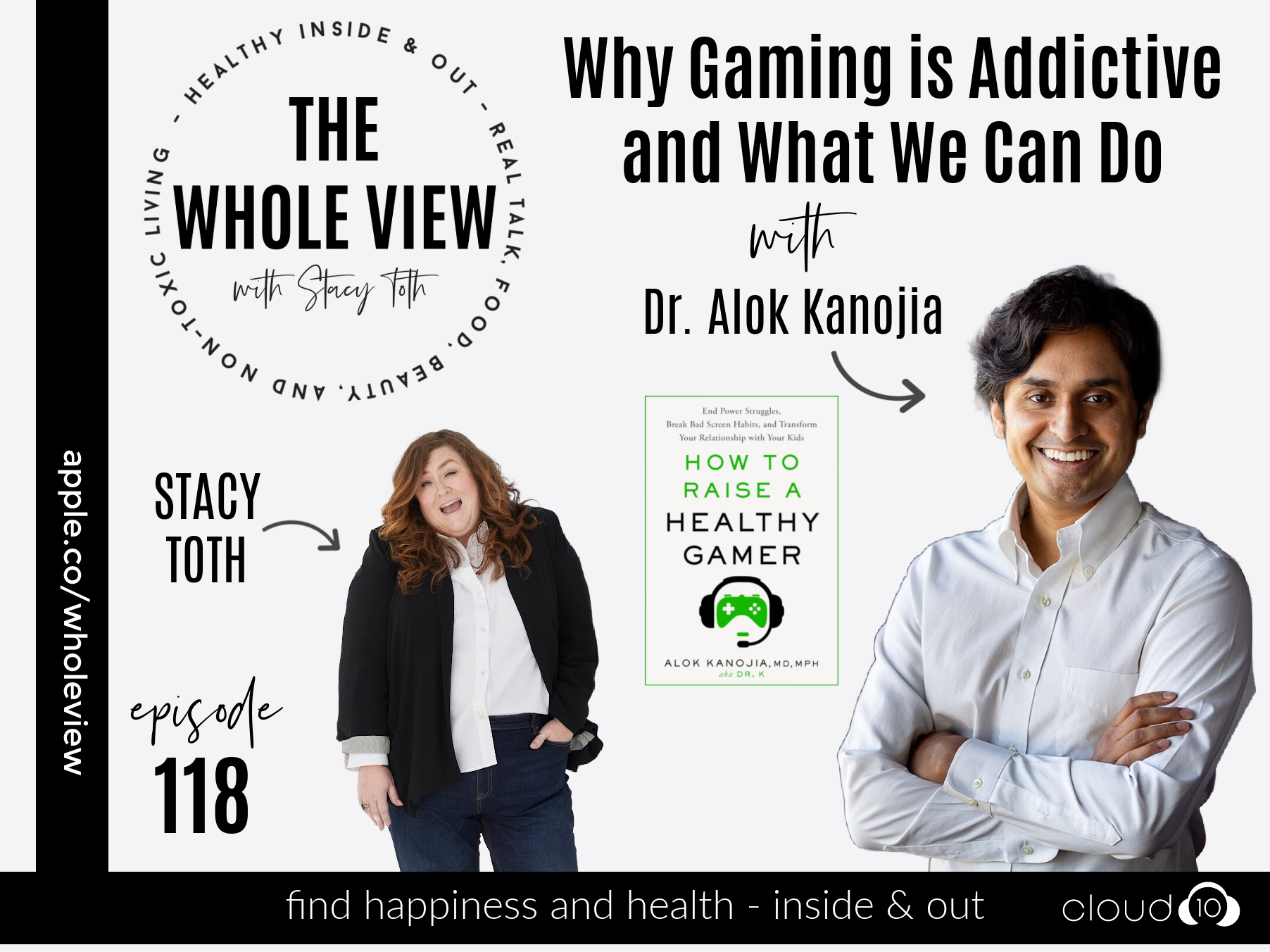Psychiatrist and co-founder of the Healthy Gamer, Dr. Alok Kanojia, or “Dr. K”, joins Stacy to discuss why healthy use of technology has become harder, why parenting skills of the past don’t translate into the modern day, and ways to have encouraging and inquisitive conversations with our kids. Dr. K shares alarming statistics about gaming and gaming addiction in men and boys, and explains the allure of toxic masculinity proponents as sources of emotional validation.
Find Dr. Kanojia:
Find more ways to connect on through Dr. K’s Linktree
If you enjoy the show, please leave a review. Letting people know on iTunes or however you listen that it’s worth their time could change someone’s life!
Key Takeaways
Introductions
- Dr. Alok Kanojia, or Dr. K, is a Harvard trained psychiatrist, founder of Healthy Gamer, and host of the HealthyGamerGG podcast
- He is private psychiatrist in Boston, MA and an Instructor in Psychiatry at Harvard Medical School. His integrative medical and psychiatric training includes Harvard Medical School’s MGH/McLean Adult Psychiatry Residency Program, over 100 meditation therapies, and an evidence-based background in Ayurvedic mental health.
- His recent book, How to Raise a Healthy Gamer, helps readers overcome screen addiction and set healthy boundaries with technologies. The book provides readers with critical information they need about gaming culture, how gaming affects developing brains, and proven solutions to treat addiction or simply build healthier habits.
Why Gaming is Addictive
This is what really surprises parents, is that most kids want to spend less time on their phone. Most kids want to play less video games. – Dr. Alok Kanojia
- Dr. K tells us what we all have experienced: Technology is pervasive. And, as tech gets more advanced it gets better and better at competing for our attention. While struggling with a healthy relationship to technology, the goal is restraint, not restriction, and building regulation skills.
- About 98{e2a5b4b931a58f767699fdd430343808d146204888b8453b8c1ba375f5682a1f} of individuals under the age of 30 play some type of video game. Furthermore, gaming addiction has almost doubled in the last 14 years.
- The reasons games are getting more addictive is they are having a whole brain effect. They have developed community, friendship, and the ability to communicate, whereas they used to just be about dopamine. Social skills atrophy, as the mechanisms that make us feel comfortable (like social cues) become underdeveloped.
- Estrogen makes us human aware of their internal emotional state; boys tend to have lower estrogen and can develop normative male alexithymia (Dr. K describes this as a color-blindness to one’s emotions).
- With this unawareness, video games can be used as a coping mechanism, which is suppressing further.
- One of the key things that keeps video games addictive is emotional regulation. So over time what happens with games is they stop becoming fun. So, the more addicted you get, just like any other drug, you develop a tolerance to that dopaminergic signal.
- Dr. K Gaming addiction warning Signs for parents:
- The most important warning sign is your gut. If you think something is wrong, it likely is.
- Neurodiversity, other substance use (i.e. marijuana)
- Comorbidities with mood disorders
- Trauma, bullying, social isolation, divorce – anything that generates negative motions will increase the risk of some kind of addiction
What We Can Do
- One of the best things parents can do is encourage conversation and inquiry. Invite your child to consider some of these things themselves. As a whole, teenagers don’t respond well to being told what to do.
- Stacy brings up concerns, especially around TikTok usage, as the kids aren’t necessarily controlling the content.
- Dr. Alok explains that all of these platforms run on emotional engagement. If you get bored, you move on, and the number one emotion TikTok engages is righteousness. It actually helps you not acclimatized to a certain emotion, so it shows content to engage different emotions, so you don’t get “bored”, as more and more you’ll need extreme content to get the same draw and attention.
- Setting healthy boundaries, and building an alliance with your kids is important and starts with empathizing and engaging in conversation:
- A great place to start with TikTok: What makes you like TikTok? Why do you use it? What do you like about it? What is the impact on you? How much time do you spend on TikTok and do you want to spend that much time? What do you enjoy about it? Are you happy about how you used your time?
- It’s important for parents not to jump on just the negative responses, as kids will often stop engaging.
The Draw of Toxic Masculinity
- Boys & men are often conditioned to only feel anger, an umbrella to a lot of emotions, so their behaviors reflect that limited range. Additionally, most men are
- Dr. K gives an example: Men’s anxiety can be expressed as being “controlling”, which is punished because that is “bad”. Their response is likely anger, which is an emotion of territorial defense and protects them from emotions like shame.
- Additionally, boys and men tend to default to instrumental coping mechanisms. If something is wrong, talking about it is not going to do anything, it just needs to be fixed.
- The real tragedy is that it’s many of those espousing toxic masculinity that validate emotions when others won’t.
- It’s hard to listen to the experiences of men when they are negative. So, what does one do if your child is repeating language and information they are hearing from these spaces like, “all women are bad”.
- So it’s really hard to listen to the experiences of men when they are negative. But it’s helpful to validate, even those unacceptable feelings. “I understand that you feel that way, help me understand why…”.
Sponsors
Want more info on our Real Life? Healthy recipes, parenting tips, and general lifestyle stuff goes out in our Real Everything newsletter, join here.
Note: Stacy and her guests are not medical professionals. This podcast is for general educational purposes only. It is NOT intended to diagnose, advise, or treat any physical or mental illness. We always recommend you consult a licensed service provider.


